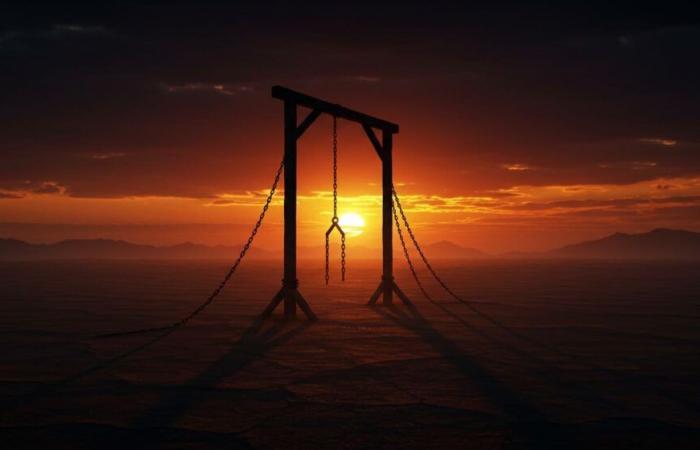In 2024, 1,518 executions identified in the world, a record since 2015. Iran and Saudi Arabia in mind, but what hides China? Click to find out!
Imagine a world where, in a single year, more than 1,500 people lose their lives under the clearance of justice. In 2024, it was not a fiction, but a brutal reality. According to a source close to human rights organizations, the number of executions identified has reached an unequaled summit for almost ten years, powered by a dizzying increase in certain countries. But behind these chilling figures, what is really going on?
A historic record in 2024
The observation is clear: 1,518 executions were recorded in 2024 through the globe, an increase of ** 32 %** compared to the previous year. This peak, the highest since 2015, where 1,634 cases had been recorded, marks a dark turning point. However, this is only a visible part of the iceberg, because some countries, such as China, escape official statistics, leaving doubt over thousands of other cases.
Only fifteen nations carried out executions last year, a number historically low. But this concentration in a handful of states reveals a disturbing trend: the capital punishment remains a weapon in the hands of a minority. So who are the main players in this resurgence?
Iran, Saudi Arabia and Iraq: the fatal trio
Let’s dive into the numbers. Iran, Saudi Arabia and Iraq share ** 91 %** of the executions known in 2024. On their own, they draw a macabre card of the death penalty. In Iran, no less than 972 people were executed, a leap of 119 cases compared to 2023. This country alone represents ** 64 %** of the world total.
In Saudi Arabia, the number has doubled, from 172 to 345 executions, often by decapitation, a practice that ices blood. As for Iraq, killing have almost quadrupled, climbing from 16 to 63. These increases are not trivial: they translate strong political choices.
Some states use the death penalty to stifle any form of dispute.
– an authorized voice in the defense of human rights
A weapon against dissent
Behind these figures, a reality is emerging: capital punishment is not only a punishment, but a tool for repression. In Iran, it was used to sanction participants in the 2022 movement known as “woman, life, freedom”. Among the victims, a young man suffering from a mental handicap, a case that raises indignation.
In Saudi Arabia, the authorities target political dissidents, in particular members of the Shiite minority who took part in demonstrations between 2011 and 2013. These executions, often public, send a clear message: any opposition will be crushed. Is this “muzzle” strategy effective or does it only fetch tensions?
-FIRST PROTE DROGUS
Another striking fact: more than ** 40 %** of the world executions in 2024 concern drug -related offenses. This type of conviction, frequent in Iran, Saudi Arabia, in Singapore and probably in China, is however deemed illegal by international law. According to the latter, the death penalty should only apply to the most serious crimes, such as homicides, not to drug trafficking.
This practice raises a burning question: why do some countries persist in defying global standards? Is it a question of sovereignty, culture or social control? The answers diverge, but the consequences remain the same: lives mowed for crimes which, elsewhere, would be worth a prison sentence.
The United States in the viewfinder
Across the Atlantic, the United States has executed 25 people in 2024, a slight increase compared to the 24 of 2023. If this figure seems modest against Asian giants, it recalls that the death penalty remains anchored in certain American states. Methods, such as lethal injection, continue to divide public opinion and arouse ethical debates.
Each execution is scrutinized, mediated, and often accompanied by demonstrations. But this relatively stable number hides another reality: the gradual decrease in states still practicing this punishment. A glimmer of hope in a generally dark painting?
China: the unknown at thousands of cases
Impossible to talk about the death penalty without mentioning China. Although the official figures are nonexistent, experts agree that it remains the world leader in number of executions. Thousands of people would lose their lives there every year, in absolute secret. Why this silence?
The lack of transparency prevents any precise evaluation, but testimonies and leaks suggest a massive use of this punishment, especially for economic crimes or drugs. This opacity contrasts with the overall decrease in the number of practicing countries. Is China the exception that confirms the rule?
A MUNTATION WORLD
Faced with this resurgence, good news emerges: 145 countries have either abolished the death penalty, or ceased to apply it. This figure, constantly increasing, shows a global awareness. States that persist appear more and more isolated, such as vestiges from another time.
However, the road is still long. As long as influential nations maintain this punishment, total abolition remains a dream. But could the figures for 2024, however alarming they are, paradoxically accelerate this movement?
What does 2024 tell us?
The 2024 data is not just a mass of statistics. They tell a story: that of a world divided between progress and repression, between silence and cries of alarm. They question our values, our laws, and our ability to evolve. So what to remember from this record year?
- An alarming increase in executions, carried by three key countries.
- Political use of the death penalty to crush dissent.
- A majority of nations turning their back on this punishment.
And you, what do you think of this reality? Is the death penalty a relic of the past or a still relevant tool? One thing is certain: 2024 will remain in memories as a year when justice has oscillated between shadow and light.






